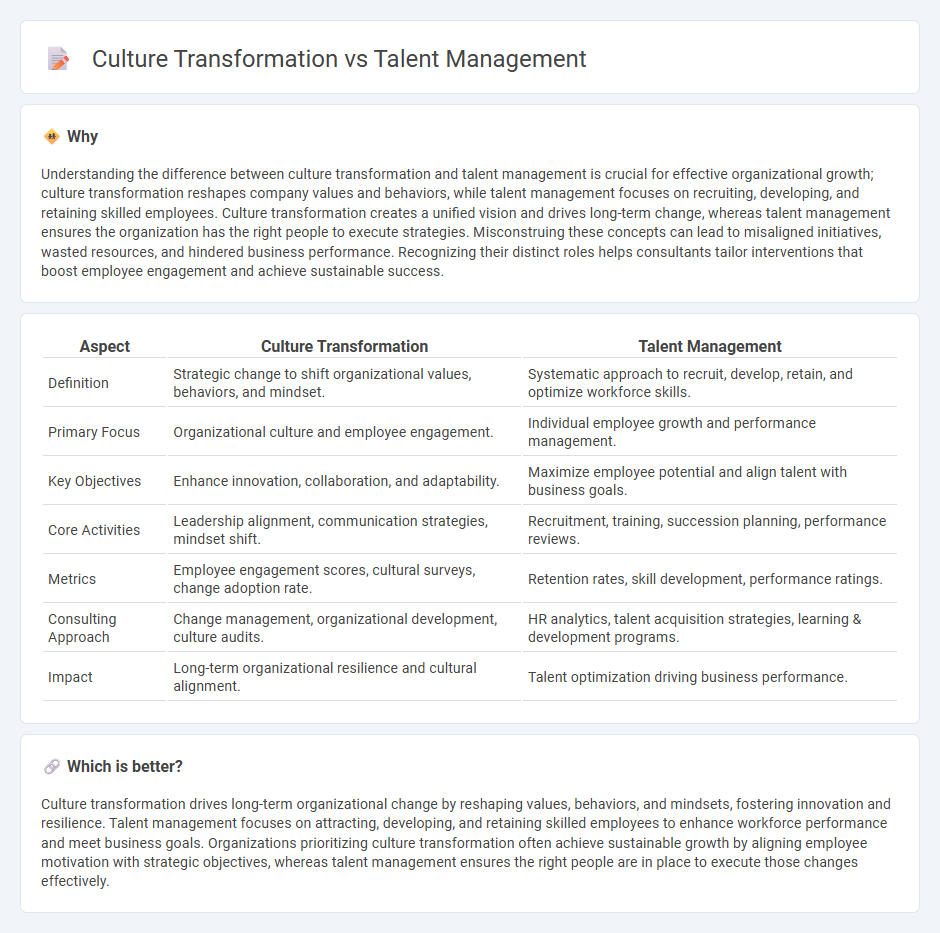
Culture transformation reshapes organizational values, behaviors, and mindsets to drive long-term business success, while talent management focuses on attracting, developing, and retaining skilled employees to meet immediate operational needs. Both strategies are essential for enhancing workforce performance and achieving strategic goals, yet culture transformation fosters foundational change, whereas talent management emphasizes individual career growth and capability building. Explore how integrating culture transformation with talent management creates a resilient and adaptive organization.
Why it is important
Understanding the difference between culture transformation and talent management is crucial for effective organizational growth; culture transformation reshapes company values and behaviors, while talent management focuses on recruiting, developing, and retaining skilled employees. Culture transformation creates a unified vision and drives long-term change, whereas talent management ensures the organization has the right people to execute strategies. Misconstruing these concepts can lead to misaligned initiatives, wasted resources, and hindered business performance. Recognizing their distinct roles helps consultants tailor interventions that boost employee engagement and achieve sustainable success.
Comparison Table
| Aspect | Culture Transformation | Talent Management |
|---|---|---|
| Definition | Strategic change to shift organizational values, behaviors, and mindset. | Systematic approach to recruit, develop, retain, and optimize workforce skills. |
| Primary Focus | Organizational culture and employee engagement. | Individual employee growth and performance management. |
| Key Objectives | Enhance innovation, collaboration, and adaptability. | Maximize employee potential and align talent with business goals. |
| Core Activities | Leadership alignment, communication strategies, mindset shift. | Recruitment, training, succession planning, performance reviews. |
| Metrics | Employee engagement scores, cultural surveys, change adoption rate. | Retention rates, skill development, performance ratings. |
| Consulting Approach | Change management, organizational development, culture audits. | HR analytics, talent acquisition strategies, learning & development programs. |
| Impact | Long-term organizational resilience and cultural alignment. | Talent optimization driving business performance. |
Which is better?
Culture transformation drives long-term organizational change by reshaping values, behaviors, and mindsets, fostering innovation and resilience. Talent management focuses on attracting, developing, and retaining skilled employees to enhance workforce performance and meet business goals. Organizations prioritizing culture transformation often achieve sustainable growth by aligning employee motivation with strategic objectives, whereas talent management ensures the right people are in place to execute those changes effectively.
Connection
Culture transformation drives talent management by fostering an environment that attracts, retains, and develops high-performing employees aligned with organizational values. Effective talent management strategies support cultural change by identifying and nurturing the skills and behaviors needed for the desired culture. Together, they create a dynamic cycle where evolving culture enhances talent capabilities, which in turn reinforces sustained organizational growth.
Key Terms
Talent Management:
Talent management encompasses strategic recruitment, development, and retention of employees to align workforce capabilities with organizational goals. It involves performance management, leadership development, and succession planning to build sustainable competitive advantage. Discover how effective talent management drives business success and fosters employee engagement.
Succession Planning
Succession planning is a critical aspect of talent management that ensures leadership continuity by identifying and developing high-potential employees for key roles within the organization. Culture transformation emphasizes aligning organizational values and behaviors to support succession strategies, fostering an environment that nurtures leadership growth and adaptability. Explore how integrating talent management with culture transformation can strengthen succession planning and drive sustainable business success.
Leadership Development
Leadership development serves as a critical component in both talent management and culture transformation strategies, directly impacting organizational performance and employee engagement. Talent management emphasizes identifying, nurturing, and retaining high-potential leaders, while culture transformation focuses on reshaping leadership behaviors to align with desired organizational values and norms. Explore how integrating leadership development can drive sustainable growth and foster an adaptive workforce.
Source and External Links
What Is Talent Management? A Guide for 2025 - Talent management is the continuous process of acquiring, deploying, developing, and assessing employees to build an optimal workforce that meets business needs and supports company strategy.
Talent Management: The Complete Guide - Talent management integrates all HR processes aimed to attract, develop, motivate, and retain high-performing employees, ultimately driving organizational performance through a holistic approach.
Talent Management - Talent management is a system ensuring the right people with appropriate skills are recruited, developed, and retained to achieve agency missions efficiently and sustain a high-performing workforce culture.
 dowidth.com
dowidth.com